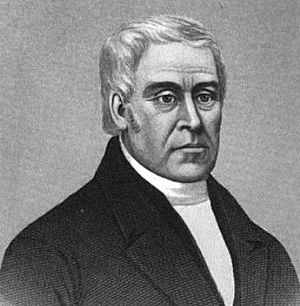James Witherell facts for kids
Quick facts for kids
James Witherell
|
|
|---|---|
 |
|
| 4th Secretary of Michigan Territory | |
| In office January 15, 1828 – May 20, 1830 |
|
| Appointed by | John Quincy Adams |
| Preceded by | William Woodbridge |
| Succeeded by | John T. Mason |
| Michigan Territorial Supreme Court Justice | |
| In office April 23, 1808 – January 15, 1828 |
|
| Appointed by | Thomas Jefferson James Monroe |
| Preceded by | Frederick Bates |
| Succeeded by | William Woodbridge |
| Member of the US House of Representatives from Vermont's 1st Congressional District | |
| In office March 4, 1807 – May 1, 1808 |
|
| Preceded by | Gideon Olin |
| Succeeded by | Samuel Shaw |
| Member of the Vermont House of Representatives | |
| In office 1798–1802 |
|
| Personal details | |
| Born | June 16, 1759 Mansfield, Province of Massachusetts Bay, British America |
| Died | January 9, 1838 (aged 78) Detroit, Michigan, U.S. |
| Political party | Democratic-Republican |
| Spouse | Amy Witherell |
| Children | James Cullen Columbus Witherill, Sarah Myra Witherell Watson and Benjamin F.H. Witherell |
| Profession | medicine, congressman, judge |
James Witherell (born June 16, 1759 – died January 9, 1838) was an important American politician. He served his country in many ways. He was a Representative for Vermont. He also became a Judge on the highest court in the Michigan Territory.
Contents
Early Life and Military Service
James Witherell was born in Mansfield, Massachusetts. This was in the area known as the Province of Massachusetts Bay. After finishing his early studies, he joined the Continental Army. He served from 1775 to 1783 during the American Revolutionary War.
He started as a private soldier. He then rose to the rank of Adjutant in the Eleventh Massachusetts Regiment. He was badly hurt in the Battle of White Plains in 1776.
Career in Law and Politics
After the war, Witherell studied both medicine and law. He received his license to practice medicine in 1788. He moved to Hampton in the Vermont Republic in 1788. A year later, he moved to Fair Haven and continued his medical practice.
Witherell became a member of the Vermont House of Representatives. He served in this role from 1798 to 1802. He also held several judge positions in Vermont.
Serving in Congress
He was elected to the Tenth Congress as a Democratic-Republican. He served from March 4, 1807, until May 1, 1808. He left Congress to accept a new job.
President Thomas Jefferson appointed him as a Judge. He became a Judge of the Supreme Court for the Michigan Territory. While in Congress, Witherell strongly supported ending the slave trade. He voted for the law that abolished it in 1808.
War of 1812 and Michigan Territory
During the War of 1812, Witherell was in charge of troops in Detroit. This was when General William Hull was away. He was captured when General Hull surrendered to the British.
He lived in Fair Haven, Vermont, while he was on parole (a promise not to fight). Later, he was exchanged and went back to his duties in Detroit. On April 30, 1821, Governor Lewis Cass and Judges John Griffin and James Witherell helped pass a new law. This law changed the name of the University of Michigania to the University of Michigan. It also put the university under the control of a Board of Trustees.
After being a Supreme Court justice for almost 20 years, Witherell resigned in 1828. President John Quincy Adams then appointed him Secretary of the Territory. He held this job until May 1830. Witherell also served as the Acting Governor of the Michigan Territory for the first three months of 1830.
Family Life
James Witherell married Amy Hawkins on November 11, 1790. They had six children together. His son, Benjamin F. H. Witherell, also became a Justice of the Michigan Supreme Court. His grandson, Thomas W. Palmer, later became a United States Senator from Michigan.
Death
Witherell died at his home in Detroit on January 9, 1838. This was less than a year after Michigan became a state. He was first buried at the Russell Street Cemetery. Later, his remains were moved to Elmwood Cemetery in Detroit.
 | Bayard Rustin |
 | Jeannette Carter |
 | Jeremiah A. Brown |

